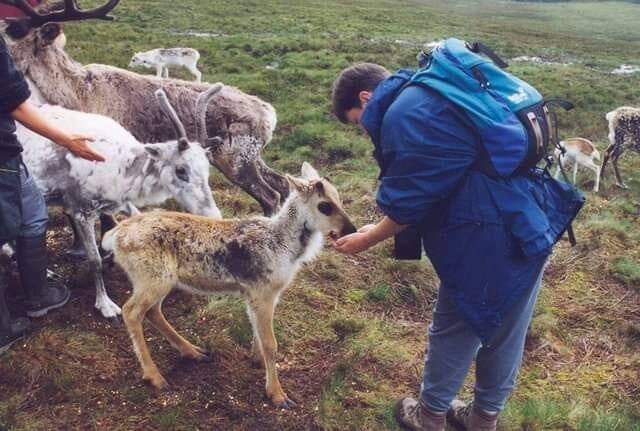
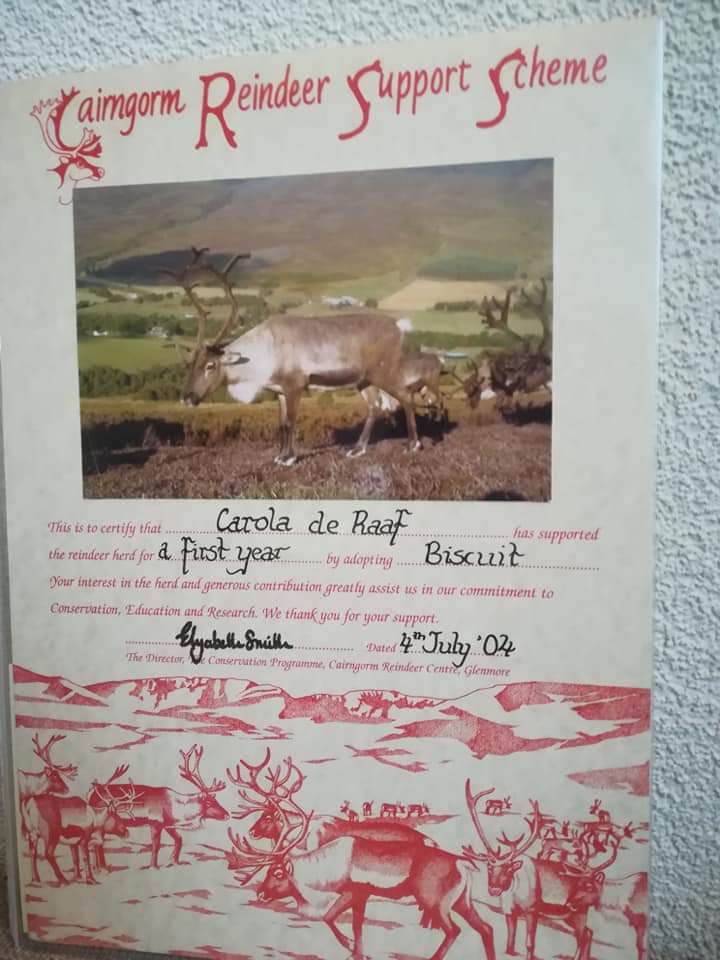
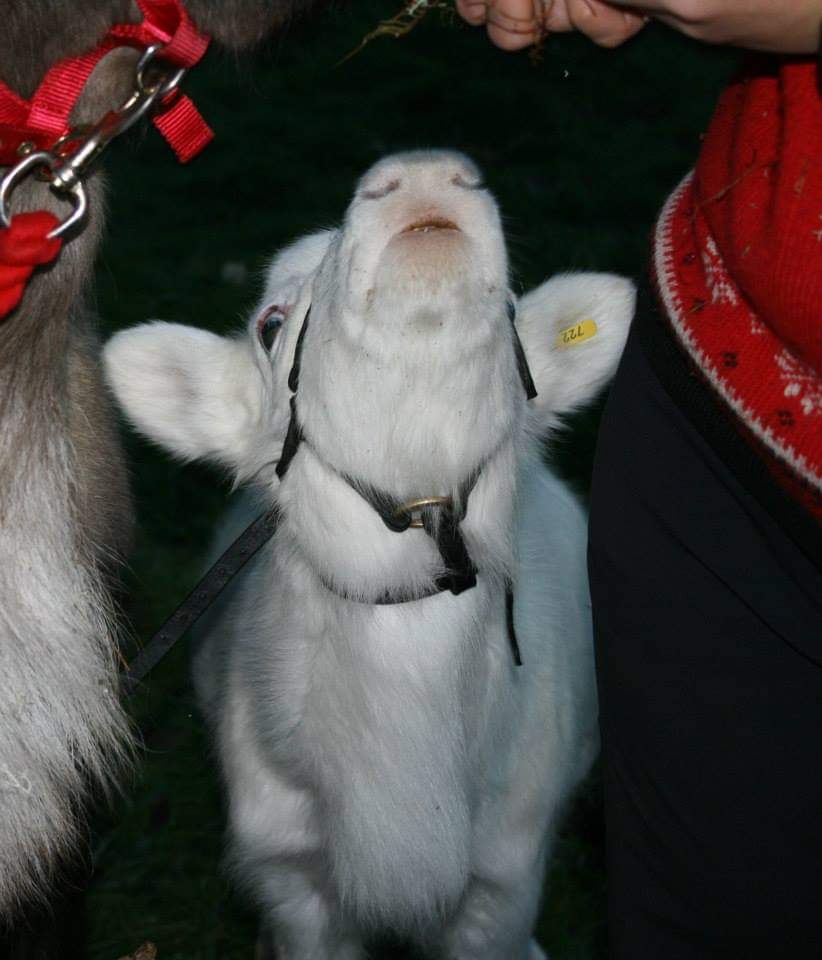
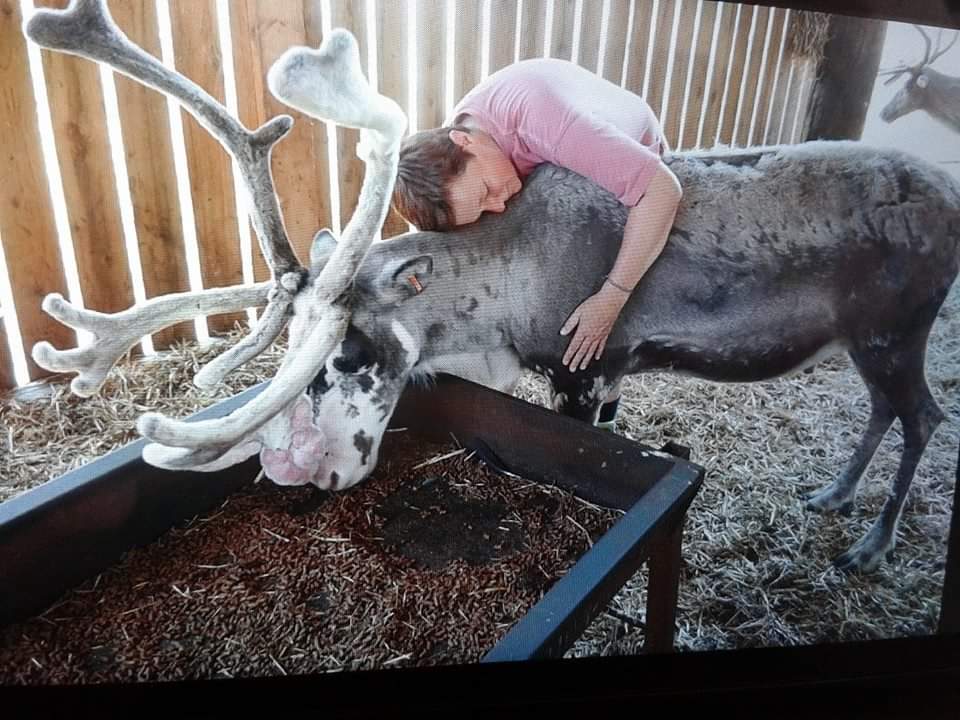
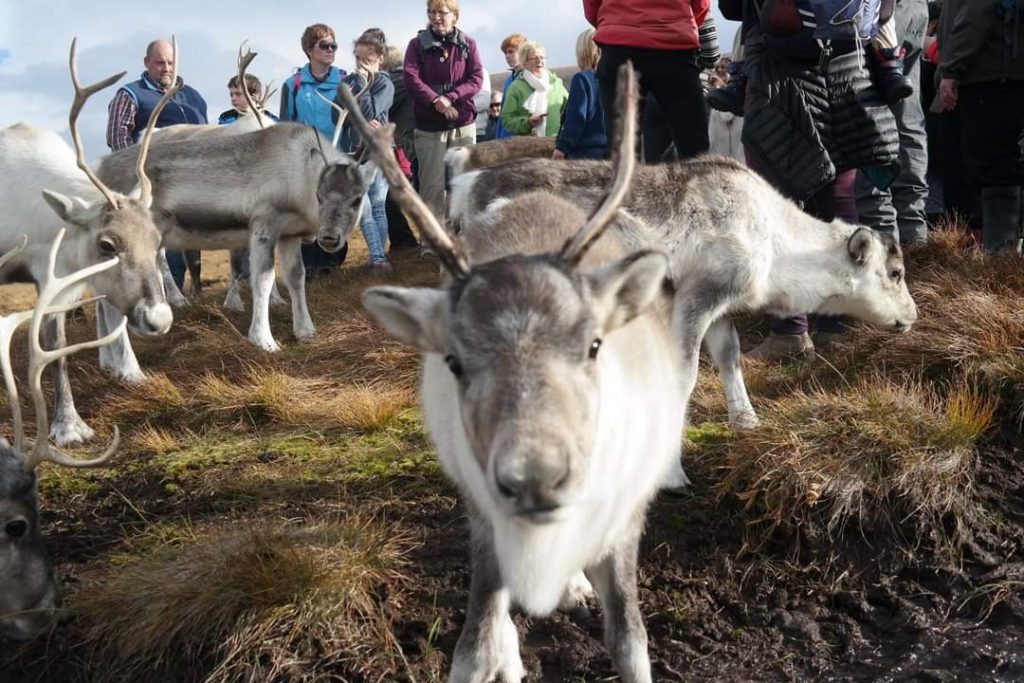
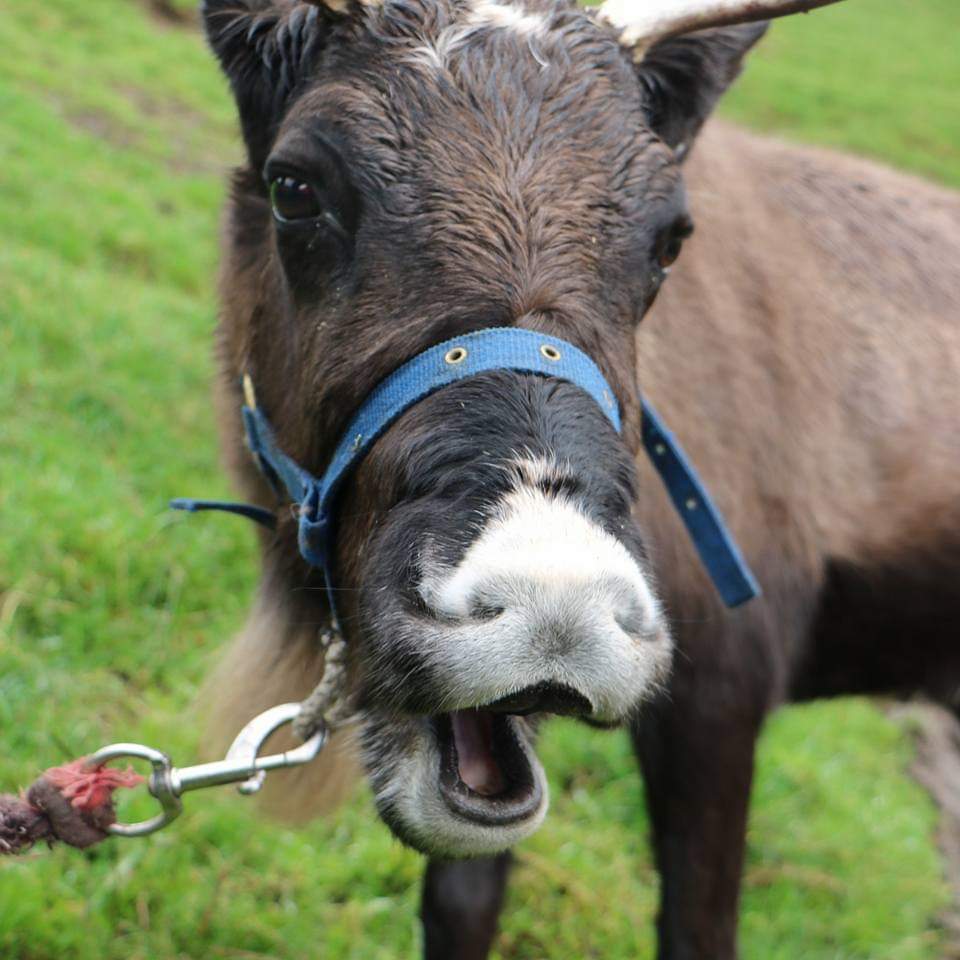
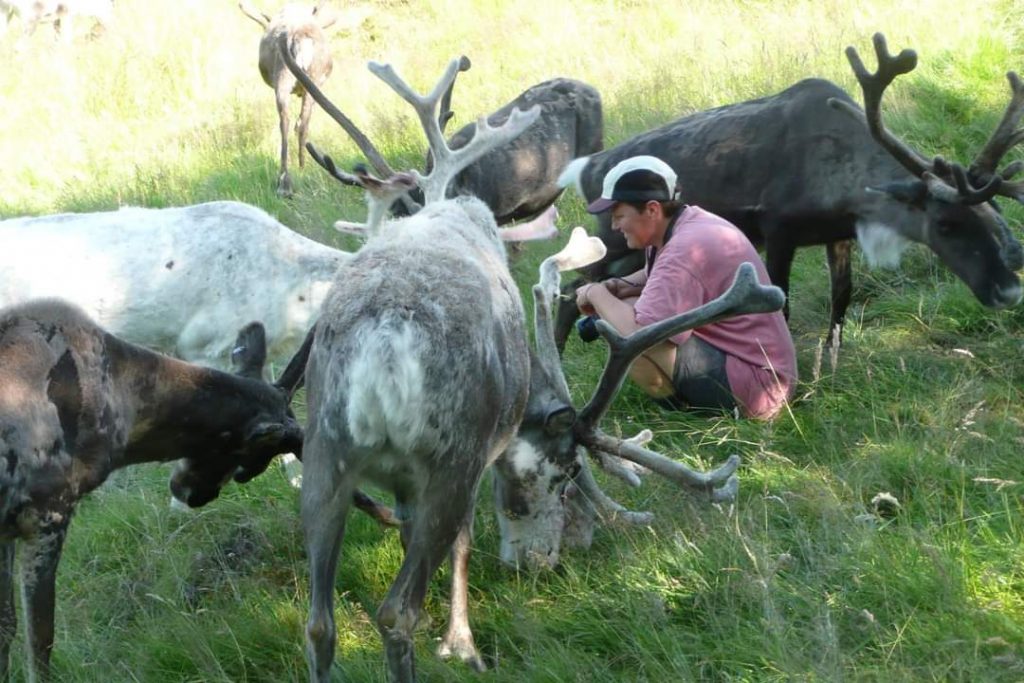
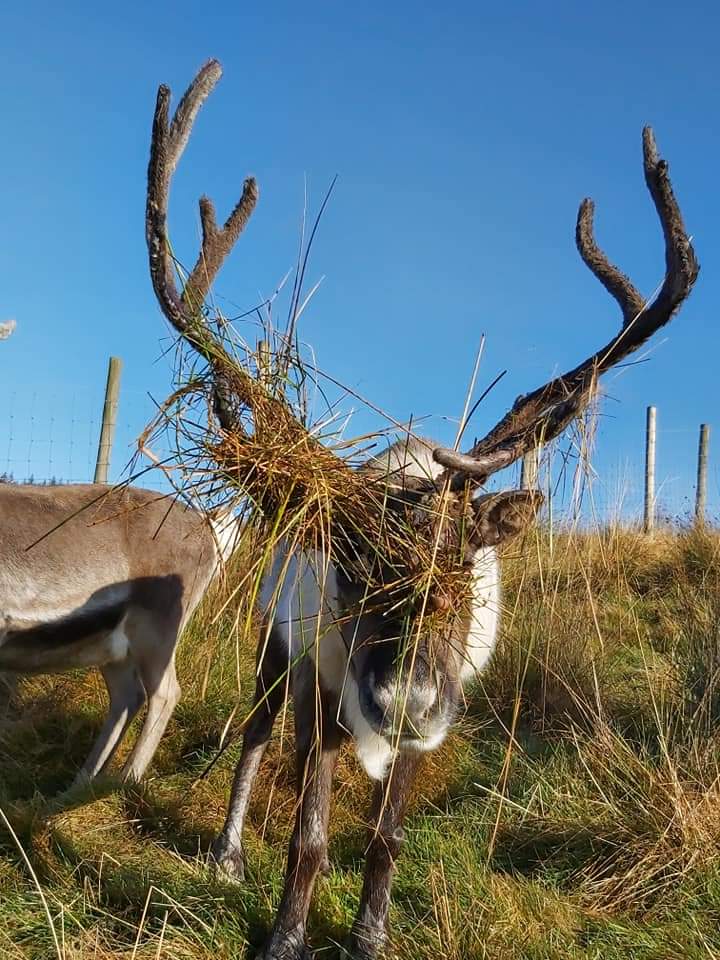
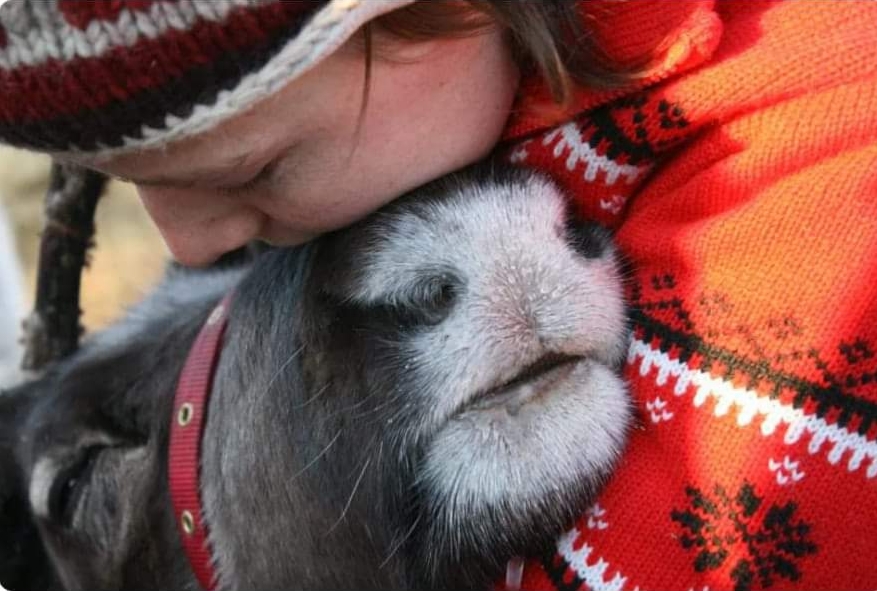
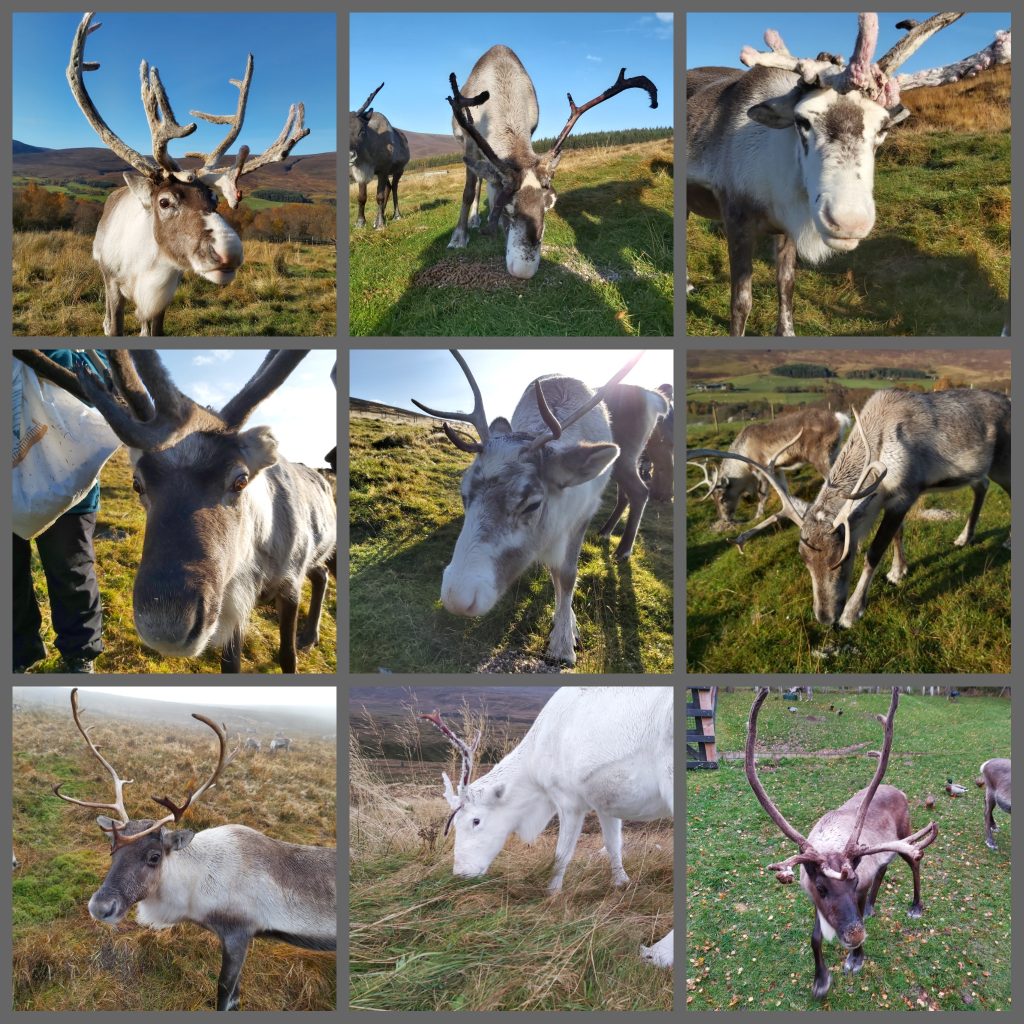

Roaming freely since 1952










Every now and then we like to feature some visitor stories in our blogs. Here’s a couple of stories from long-time reindeer adopters Karen, Steve and Sally 😀
Karen and Steve, Moray: We started to visit the herd on holiday every year in 2011, we loved seeing and feeding the herd. When Blue was a year old, he followed me around on the Hill Trip and I fed him. My son took a wonderful picture of myself stroking his chin which he seemed to love, and I fell in love in an instant! We then adopted him until he sadly died; at the time I was going through breast cancer which hit us hard as I was just recovering from my third surgery at the time. We wanted to adopt a family member of Blue’s so transferred the adoption to LX, his brother, whom we have met once on the Hill Trip and fed! We are so privileged to be adopters and we love these beautiful animals so very much, it fills us with joy when we visit them! When we were adopters of Blue we even had t shirts made with the picture below saying respectively ‘I am Blue’s Mummy/Daddy’ on and wore them proudly when we visited them which gave the herders much laughter. It was very surreal how Blue seemed to bond with me that first day, he seemed to feel my loving energy towards him, and we loved his beautiful white colour (like his father before him) although we learned he was not an albino.

To see how these wonderful people are so devoted to these beautiful and gentle animals is so fantastic, and to see them in their own habitat is even better and extremely important. We took our best friends Esme and Kevin up and they fell in love with the naughty Bond, so for Christmas we adopted him for them! We got the pack, and I wrote a poem in 4 verses or so to see if they worked out what the present was, and Kevin got it after 3 verses! They were very joyful to get this as a Christmas present, and we hope to visit again soon since we now live in the Highlands in Speyside at last!
Sally, Colchester: My encounter with the Cairngorm Reindeer Herd started in August 1998, the day was awful, raining heavily, I remember jumping over deep puddles and running water in the hill enclosure, you can see from the photo I oblivious of the weather condition! Totally enraptured with the two furry noses nuzzling my hand, staring at the gorgeous big deep brown eye and the enormous grin on my face totally besotted! They were extremely greedy and it looks like I’m about to fall over backward but I don’t think I did. I then retuned in 2016 to be a volunteer during my holidays.
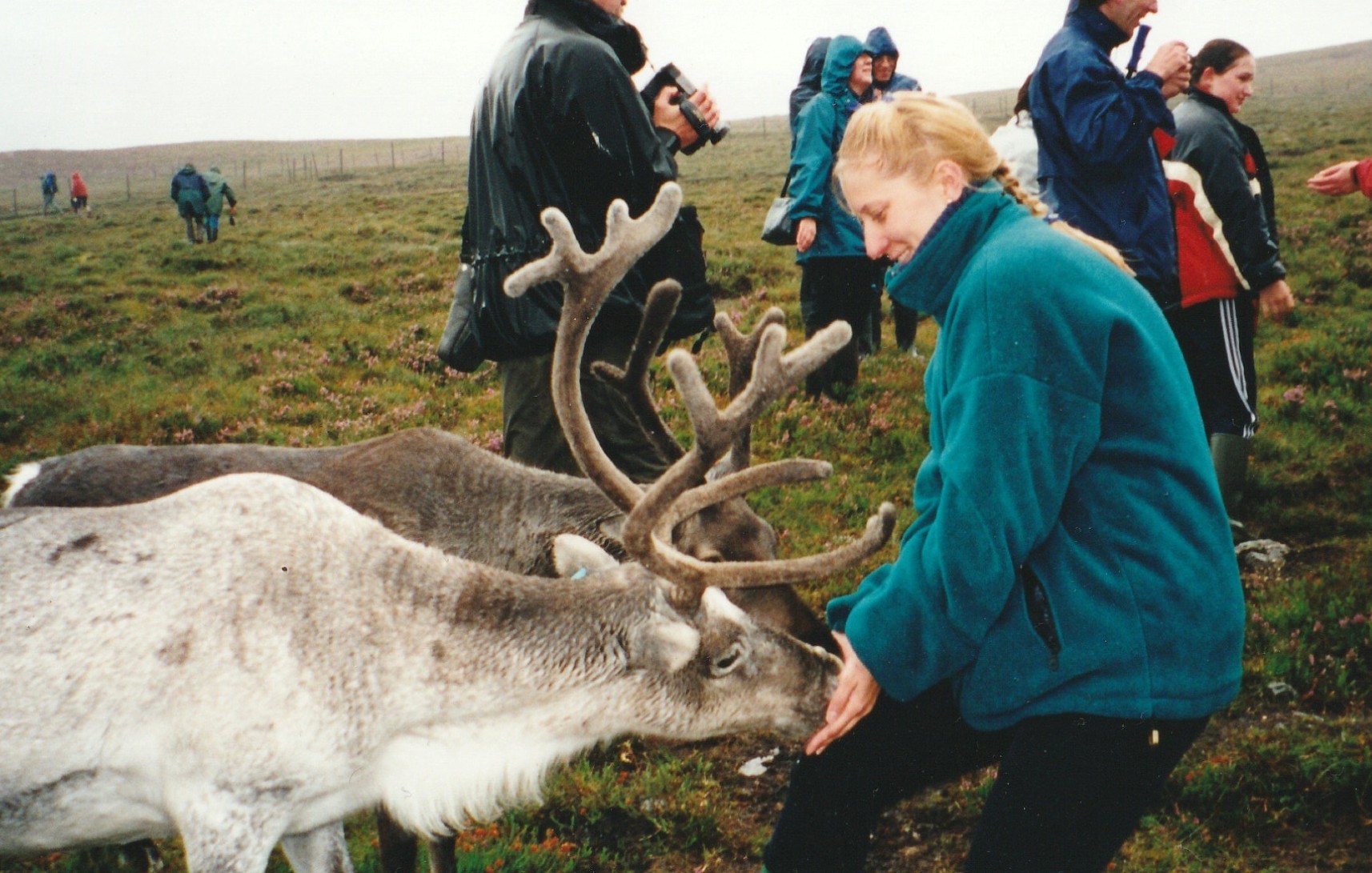
My next encounter wasn’t until 2016, for the second year running I had booked to go on a hill trek but had to cancel for ill health. My friends still went and I was (not very bravely) holding back the tears of disappointment. My friends went off for their adventure and I was left waiting in the shop for them to return (4.5 hours later). An angel called Tilly then asked a herder to take me to the Paddocks and show me the reindeer there and show me what jobs are completed throughout the day. Best 4.5 hours of my life!
I have since returned a few years running as a volunteer during my holidays. My favourite time is either the afternoon I spent in the hill enclosure picking up poo, bags and bags of it, or showing a child how to feed the reindeer – they’re nervous to start with but have the biggest grin on their faces once they’ve managed it, then there’s no stopping them, or talking to visitors in the Paddock. My absolute happy place is sitting amongst the reindeer after a Hill Trip, the reindeer lay down and digest their food, I’m so close amongst, everything is quiet and peaceful, the reindeer adorable, the scenery amazing and the fresh air so clean.
All silent on the hill – just the wind, maybe a raven overhead. Then, in amongst the herd, surrounded by soft clicking as the reindeer move around us. Easy to stand with eyes closed and hear how they move, where they are, feeling a timeless sense of ‘reindeer-ness’ that stretches way over the northern lands. Imagining the clicking in a white-out in the winter, wind howling but always hearing where each other are. It’s a reassuring herd message, effortless on the reindeer’s part and made by their hooves.
One of the herd here is leucistic – a white coloured reindeer named Blue (born in a cheese-themed naming year). Blue is also deaf, so doesn’t hear the clicking. One day I saw Blue wandering off alone, and wondered how the herd relates to him, a herd member who doesn’t respond to the kind of reindeer body language and communication that is shared by the clicking. Like, if there’s the need to run, Blue may not hear how the clicking speeds up around him. It’s not a problem here – there’s no danger to run from, and the herd live out their lives to the full and any unusual behaviour is noticed straight away.

The path up to the herd goes over the Utsi bridge – named after Mikel Utsi, the Sami reindeer herder who introduced and established the first herd here back in the 1950s. Before then, the Cairngorms hadn’t seen reindeer for perhaps 1000 years, and way before then, it would have been in the Ice Age climates that the reindeer really thrived across the land. Mikel Utsi died in 1979 and the bridge was rebuilt at that time and named after him. His name is carved into a large granite boulder by the bridge and we pass this boulder many times each day. For me it’s a very special thing – this boulder probably came here with the glaciers as the landscape was formed, and there’s an odd sense of completeness with the Ice Age, the boulder, Mikel Utsi and the reindeer.
Why did I come here? – well, I wanted to understand reindeer better by being around them and amongst them. I’ve had a long term passion with Ice Age cave paintings and carvings, and have dealt with antler (mainly from Scottish red deer) as part of what I do. I work as Leaf Trading Post, supplying antler and prehistoric materials to flint knappers, museums and the like. I also work as Helen Leaf Designs, which is where I create beautiful things inspired by nature and prehistory. I work with antler, wood, silver and bronze. I’m interested in the traditional carving of Inuit and Maori peoples, but I try to work in a way that’s true to myself rather than just copy another culture.
I love working with antler of all kinds, but reindeer antler is special as it ties me in to the prehistoric images that inspire me so much. I’ve learnt so much about reindeer in my week here – kind of like reconnecting with my own Ice Age self. So now, when I carve a reindeer into antler, I understand more of the face, the antlers, the muzzle, and the lines of colour and shape. I can also recall the feel of their fur, the soft calling between mother and calf, and yes, the clicking of the hooves as the herd passes.
Helen
So what’s the deal with leucism?
Are all white reindeer leucistic?
Are all leucistic reindeer deaf?
How is leucism passed on?
How is leucism different to Albinism?
These are questions I have pondered while fixing the boardwalk, closely accompanied by Blue, our male leucistic reindeer. The subject of leucism is quite hotly debated and seems only those with a Doctorate in Pathology may comment, but here goes:

Leucism (pronounced loo-kiz-im) is a genetic peculiarity which gives a white colour. The condition is recessive. It is a defect in the skin, not the pigment cells. Leucistic animals are all perfectly white. It seems however that there are differing levels of the condition – partial and full.
One other characteristic of leucism is deafness, however is seems that this is not always the case. Leucism is developed during the early stages of embryonic development and can influence the central nervous system. It therefore most commonly affects sight and hearing.

If a condition is recessive it means that the offspring must receive the leucism gene from both parents to develop the condition. We have leucism in the herd. It doesn’t affect the carriers at all but if they breed with a carrier there is 25% chance that their offspring with have leucism. We currently have two leucistic Reindeer that are both deaf – Blue and Blondie.
Blondie’s(ll) father was Sirkas (Ll) and mother was Glacier(Ll) both carriers, therefore there was a 25% chance that Blondie was born with leucism. Glacier had nine calves of which only one was born with leucism but of course several carriers.


Blue’s(ll) father is Lego who had leucism (ll), Blue’s mother is Lulu who was a carrier (Ll). There was therefore 50% chance that Blue would be born with leucism.

Albinism is a total deficiency of melanin producing cells in the skin. It is a skin mutation. There is a total lack of pigment. Albino animals have pink/red eyes. The pigment (colour) that would normally be seen in our eyes is missing so the blood vessels behind are seen in the eye, given the appearance that the eye is red in colour.
As I do not have a Doctorate in anything (except drinking tea) these are not comments but merely my interpretation of several articles written by Doctors of Science.
Dave
The second installment in Emm Cassidy’s volunteering blog. This is the second of three and this week Emm got to meet lots of dogs as well as the reindeer!
Day 2
I turned up at Reindeer House at 8am forgetting it was an 8:30am starts as it was a week day and I met Dave who is originally from New Zealand. When Imogen arrived she started doing some knitting, which I found interesting and I enjoyed talking about knitting with her as my Granny had knitted clothes for my teddies. With Imogen, I did poo picking in the paddocks whilst the others went to check the reindeer on the hill and give them their breakfast. Some reindeer had been in the extra paddock on the Saturday when it was the changeover day where they had been swapping reindeer from Tilly’s farm, the hill enclosure and the paddocks. One was Boris, a lovely reindeer with an odd shaped nose who is Mo’s cousin. We put out breakfast for Beastie, Ost, Aonach and Nutti (the 4 paddock reindeer) in 4 bowls and then put lichen on top of each. Imogen said we don’t mix the reindeer feed and the lichen together as the reindeer don’t like that.
I went with Dave on the 11am hill trip. He wears a really cool green hat with a ptarmigan feather sticking out of it. When Dave did the introduction talk in the carpark, I realised that different reindeer herders had different sayings when they gave their talks. I thought that is really nice and makes the hill tour their own. When most people had gone, we started to make our way down to the enclosure gate. We found the reindeer relaxing and lying down again by the fence sunbathing! I was slowly identifying a few individuals too as I had been making notes on my herd list every time I go up there.


I ate my lunch in the front garden looking out on to the mountains and trees with Fiona and we talked about lots of things. I then played fetch with the 3 dogs and they barked with excitement all wanting the toy – bless.


On the 2:30pm hill trip, which I did with Abby, we met Fran and her mum. Fran is a research student doing a study on where the reindeer graze each day, with radio collars on 6 reindeer in the hill enclosure. It was very interesting and I was there when we took the radio collars off them and she showed me them and how they worked. She also had made them reindeer proof and weather proof. Fran found out why Bourbon (who had a radio collar on) had a poorly tummy by looking back at the data where he had been the night before. It turned out Bourbon was down in the forest eating the wrong type of mushrooms.
I found out my mum and dad had seen me through binoculars and when I got back to my car, they had left a note saying:
3:30pm, lol! Saw you leading them up! Ha Ha! We were up the top looking down!! Mum, Dad xx
Me and Fiona were on duty to give the paddock reindeer their tea and put them to bed in the woods. I put the dark grain pellets in their trough in their stable then went to get some buckets of reindeer feed and lichen. The reindeer were getting very excited as there was food so they followed me up to their troughs. Whilst I put out the reindeer feed and their lichen on top I had to dodge their massive antlers. It was quite funny as one reindeer was trying to eat from the bucket whilst I poured the reindeer feed in the trough. We then closed the paddocks for the night.
Day 3
Met Imogen’s dog called Brock, Dave’s dog called Tui and Alex (Fiona’s brother) and his dog Tip. At one point, there was 6 dogs in Reindeer House. I put Dave’s hat on Brock and took a photo of him, he looked so cute. I met Sarah who is a part time reindeer herder. Later we separated 8 reindeer from the herd and Fiona showed me how to put a head collar on a reindeer which I enjoyed learning about. I put a head collar on Blue and Duke. In the shed, we had 5 yearlings which included Scolty and Bhuachaille, then a 2 year old called Baltic and the 2 older reindeer called Blue and Duke (the role models) who will show the younger reindeer how to be led and behave on a head collar. For training, we went on a walk around the top enclosure. I led Duke and Baltic up the hill.

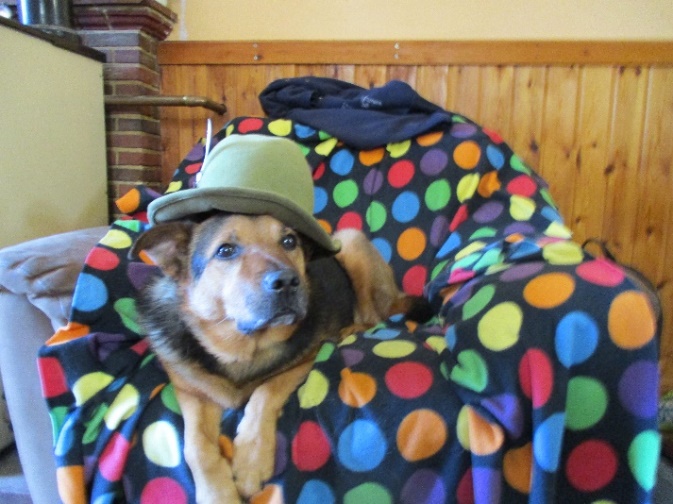
Baltic was stubborn at first but then Duke started trying it on as I was new to this. But by the top of the hill, Duke knew who the boss was and Baltic was happier with being led as he was getting used to it. The training is important for the reindeer as this will get them used to being handled, health checked and to become brilliant Christmas Reindeer.
On my 2 hill trips today, I herded all the reindeer out the shed as they were all cooling off in the shade. The shed doesn’t look like it can fit 41 reindeer in but it does, it is like Doctor Who’s Tardis! One time when I was herding them out of the shed, I realised that I hadn’t seen Blue, I found him by the shed asleep. Blue, who is deaf, didn’t hear his reindeer friends move on – bless him. Near the end of the hill trip, the reindeer leisurely make their way up to the shed gate knowing they will be let back in soon. I really like this time as it is just us reindeer herders approaching them after everybody has left.
We are met by reindeer lying down relaxing and sunbathing. I really enjoyed that quality time relaxing with them and sitting by them giving them some fuss, talking to them and getting to know them more. This is where I did my selfie with Mo!
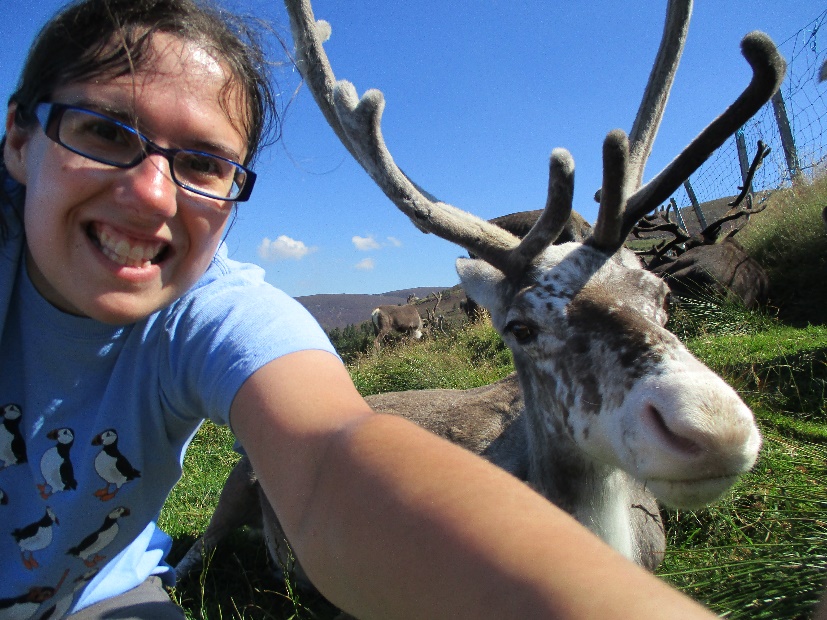
We then let them into the shed for shade if they wanted it before we went back down to Reindeer House. I also learnt the reindeer language today which Utsi did with the reindeer.
Day 4
In the morning, we counted and herded the reindeer into the front enclosure and gave them their breakfast. Kota and Boxer didn’t seem themselves as they were very slow about moving into the front enclosure with the herd so we took them into the shed to check them over. They had their temperatures taken which revealed they both had high temperatures. That can be a bit dangerous for reindeer so Hen gave them both injections to bring their temperature down. Boxer then had an infected antler treated and then had sun cream on to protect his antler. We rewarded Boxer with some lichen. Kota and Boxer were so brave. We then put them out in the pen near the shed enclosure making sure they had plenty of food and where we can keep an eye on them.

We then let the reindeer into the shed as Hen needed to fly spray (citronella) them to keep the flies and midges off their antlers. Hen did the spraying in two groups as it would be chaos if all the reindeer were in at the same time. Mo stood quietly in a corner behind me after he had his done as he realised if he kept running around that he would get more spray on him. I gave him a big fuss and talked to him saying he was a very clever reindeer.
I did the introduction talk at the start of the 11am hill trip and the herd history talk at Utsi’s Bridge on the 2:30pm hill trip. That was such a massive thing for me to do. I was so proud of myself.
Whilst I was poo picking the paddocks, mum visited and Imogen told my mum how well I had done that day with doing the two talks. Everyone was so proud of me and I was very proud of myself and I was getting so much more confident dealing with new people.
Emm
Sonya, author of this blog, came up to us in June to volunteer with our beautiful reindeer. She has very kindly written us a blog about her experience, and we will be sharing it over the next few weeks. Thanks so much to Sonya for coming along and being so helpful, and we really hope to see you again in the not too distant future!
Day One
In June 2016 I arrived for my volunteer placement at the Cairngorm Reindeer Centre in Glenmore with no previous experience of working with animals but lots of enthusiasm and affection for the reindeer I had visited as a tourist many times before. I had recently taken the opportunity to take voluntary redundancy from my 20 year career and had a whole summer to fill before starting university in September. I had no idea what to expect but was seeking solace and comfort in the remoteness of the fabulous Cairngorms and the company of the placid reindeer. I was blessed with a rare dry day on the first Monday and arrived promptly at 8am alongside fellow herders Imogen who has a zoology degree and big-bearded Dave who I later found out to be exceedingly well travelled and originally from New Zealand. By the way, it’s the beard that’s big, not Dave himself.
So after meeting a confusing muddle of strangely named dogs, I was introduced to Fiona who runs the Centre, and tasks were allocated for the morning. Can you guess what my first job was? That’s right…. reindeer poop scooping. Keen to carry out all necessary tasks enthusiastically, I wielded the bespoke pooper scooper and collected a remarkable bucketful of the stuff from the paddocks. A few of the herd are kept in the paddocks for two weeks at a time so they are more accessible to very young, old or less-able visitors who can’t manage the hill trip to see the whole herd. After scooping all the poop I could find, transferring the contents of the bucket to a sack was a trickier and less appealing task but the trusty Dave was on hand to show how it’s done without spilling too much. I confess from that moment on I found myself a pair of gloves for this task and many others, much to Dave’s derision, I suspect. But hey, you can take the girl out of Essex………
I had a full and detailed explanation from Dave on how to open up the exhibition ready for visitors and spent some time replenishing the children’s craft materials, I wish I was 5 years old again so that I could make paper chains or make an antler headband, and draw colourful pictures of my reindeer friends. However, with pencils sharpened, loan wellies sorted into sizes and the shop vacuumed, it was time to set off on the first hill trip. The tourists were very impressed with Dave’s authentic appearance of bushy beard and battered green hat and took several photos of him and the van before we even set off. I’m convinced I need to change my image, which currently consists of generic walking attire, so as to appeal to the tourists but I am stuck for inspiration, more of this later.
On the first hill trip the cheeky Svalbard is overly friendly and pushes and prods me repeatedly with his antlers and nose. The tourists mistake his behaviour for affection and there are many oohs and aahs and clicks of cameras, however it’s far more likely that he recognised the smell of food on the jacket I was borrowing from the Reindeer Centre.

I also learnt that my adoptee ‘Gandi’ is there somewhere, in amongst the swirling sea of moulting coats and velvet antlers that greeted us. Correction, they are greeting the sack of food, not us, and I have learnt they couldn’t care less about us or how the food gets there. Despite this pragmatic realisation, I am still deluding myself that Gandi recognised me, if he could talk he’d even remember my name, of course!

I am delighted and relieved to see him in such good health with a remarkably majestic pair of antlers. I feel inordinately proud that I chose such a worthy recipient of my sponsorship, for he is also a recent TV star in the BBC Scotland programme about the Highlands due to be shown across other BBC regions in Autumn 2016.
After lunch Dave teaches me how to mix the reindeer food, I was keen to get started as I love a piece of machinery and rather ingeniously, I thought, a cement mixer is used to mix the food. And when you realise the quantity of food they get through, you realise why it’s necessary to mechanise the process. There is little demand for a commercially available reindeer food, as this is the only large free-ranging herd in the UK, so I was shown the recipe and the shed full of ingredients. We started with sheep food containing corn and grains, then added extra barley, some starchy sugar beet, some fibrous malt pellets which are a waste product from the numerous nearby distilleries, added a sprinkle of a secret mineral supplement and four big handfuls of hay enriched with garlic and molasses. Well this was all fascinating for me and I was enjoying making this tasty treat until we ran out of grain. Dave despatched me to the shed to fetch more barley, all good so far. I located the barley and saw with some dismay how huge the new sack was. I should mention at this point that I only manage to measure five feet with my shoes on, and the heaviest thing I’d lifted in my previous job was a bottle of Chanel No 5! Battle with the barley sack commenced but I should have been grateful for small mercies as some of the other ingredients are much heavier.

By the time we had mixed about half a cubic metre of food, it was a relief to leave behind the previously fascinating cement mixer, and head up to the hill again on the 2:30pm trip. Dave encouraged me to carry the sack of food but I chickened out and took the lighter and smaller sack of hand feed. Poor Dave gets the bigger, heavier sack yet again, but gallantry isn’t completely dead in my world!
Near the end of the trip Dave gets a phone call, we’re a 20 min walk from the nearest road and goodness knows how far from the nearest dwelling but amazingly there’s a mobile signal in the reindeer enclosure. I can’t always get one of those in flat, overpopulated Essex. Anyway the phone call is to invite me to the reindeer shed to see some vaccinations taking place where I met the famous Tilly, Fiona’s mum and owner of the herd. The injection is to help prevent the potentially fatal red water fever that can kill a reindeer if not caught early enough. Imogen had previously told me that Tilly always comes to administer these injections as there is a tiny chance the reindeer will go into anaphylactic shock and she has the most experience to deal with that possibility. Despite their huge antlers and sharp hooves, I had never felt even remotely intimidated by reindeer before. But closed in a tiny shed with six of them circling round and round in an effort to escape the needle, it felt a bit like being caught up in a whirling dervish of hoof and hair and taught me a greater respect for the fact they are still wild animals even though they generously humour us with their presence and grace.
Day Two
Tuesday starts with much excitement and anticipation when Fiona tells me I can join her and Hen on a harness training session. Hen is the longest serving herder based at Reindeer House other than Fiona and I found out she can recognise and name every single reindeer, as can most of the herders. However, if a pair of antlers are cast in the autumn, Hen knows which reindeer they belonged to as she recognises the distinct and unique form of each and every reindeer’s antlers even when they’re no longer on the animal. The Cairngorm reindeer participate in many Christmas events across the country and it’s important they keep practising with the halter and harness throughout the year so that Christmas is a relaxed affair with no anxiety. Another treat for me is that my adoptee Gandi is one of the reindeer coming along on the practice session because he and Elvis are experienced trekkers and will set a good example to Camus, Balmoral and Shinty. I hadn’t met the last three reindeer before and I’m pleased to say they all did very well with their training. Shinty was the most reluctant to get going and he gave Hen a thorough workout by making her tug him up the hill, but with Gandi encouraging him from behind, we were soon underway on our circuit.

So this is Hen on the left and me on the right with reindeer (from left to right) Elvis, Shinty, Gandi, Camus and Balmoral. It was to be the last glimpse of the sun for several days so I’m glad I took up Fiona’s offer to take a photo of me with the reindeer and I sent it to my ex-colleagues to illustrate the dramatic difference to my working day.
The rest of the day was spent on hill trips with tourists, becoming more familiar with the information we impart to the eager visitors. Many people meet a favourite reindeer on their visit, as I did with Gandi, and decide to adopt them. In between the trips we all work on the biannual newsletter as it’s time to send it out to all the reindeer adopters. This edition of the newsletter features many tales of the reindeer and activities and events at the centre. There are some hilarious stories about Fergus, a hand-reared calf who has turned out to be a very cheeky boy indeed, and sadly, there’s a moving obituary to Grunter, a much loved reindeer who was also hand-reared when he was a calf.
I’ve learnt the name of another member of the herd today, the endearing Blue, who was named in the year of cheeses 2013. He was born with a condition which means he is very pale, almost completely white and he’s also deaf. Many visitors think he is albino but Imogen explained to me that albinism means a complete lack of pigment, whereas Blue just has a reduced level of pigment which means he is Leucistic. His skin is very pink and prone to sunburn and any broken skin could lead to infection so he has bright yellow ‘summer cream’ on his face which is a mix of sunscreen and insecticide to keep the midges away. Blue has been a bit slow to come for food today and hasn’t hand fed from the tourists as much as normal so on one of my hill trips with Imogen, it’s necessary to take his temperature once the visitors are gone. I’ve seen this before and it involves luring them close with an irresistible bucket of lichen to get a halter on them, one person holds the head while the other person takes the temperature from the ‘other end’. Whilst Imogen does the ‘business’ she regales me with detailed advice about insertion of the thermometer, which angle is best, how long to leave it in, etc. I decide it’s time to manage her expectations and make it clear, I’m happy to learn the theory, but as far as practise goes, I think I’ll remain at the head end, thank you very much!


Today I also discussed with Imogen how I could possibly look less like a tourist when we take the visitors out. Her insightful but wildly impractical suggestion is that I should dress for conditions at least ten degrees warmer, so go up the hill in just a t-shirt when everyone else is in hats and jackets, and claim it’s a warm day. I fear this soft southerner might catch her death if she attempted that, so I bear it in mind but keep my multiple layers firmly in place.
Sonya
Stay tuned for part 2 of Sonya’s blog, which will be out in a couple of weeks!